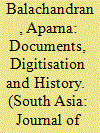| Srl | Item |
| 1 |
ID:
184804


|
|
|
|
|
| Summary/Abstract |
Recent years have seen a very large rise in digitisation projects in various state-administered archives in India, including the National Archives of India and regional archives in different parts of the country. This essay argues that rather than increasing access and transparency, digitisation serves to reproduce and potentially even increase state control over historical sources and memory. In addition, the elision of context in digitised collections in state archives poses problems for historical research, particularly for scholars from less privileged institutions. It is imperative that these efforts go beyond an understanding of digitisation as conservation alone in order to harness the creative and pedagogical possibilities offered by digital technology to influence, and even transform, the historical scholarship of a wide variety of users.
|
|
|
|
|
|
|
|
|
|
|
|
|
|
|
|
| 2 |
ID:
164873


|
|
|
|
|
| Summary/Abstract |
This article explores the entwined history of early colonial urbanism and the articulation of legal subjectivity under East India Company rule in South India. More specifically, it looks at petitions from outcaste labouring groups to the Madras government in the late eighteenth and early nineteenth centuries. Although early colonial petitions were unequivocally products of colonial rule, which derived their distinctive form and language from colonial law, a reading of the petition archive is one of the only ways to achieve a historical understanding of the city of Madras as it was experienced by its less privileged inhabitants. This article looks at the delineation of the communal selfhood of subaltern urban communities through petition narratives, arguing that the variety and innovativeness displayed by petition writers is testament both to the acceptance of colonial legality and to the agency of native subjects in negotiating with, and appropriating the language and rationale of, the colonial legal regime.
|
|
|
|
|
|
|
|
|
|
|
|
|
|
|
|